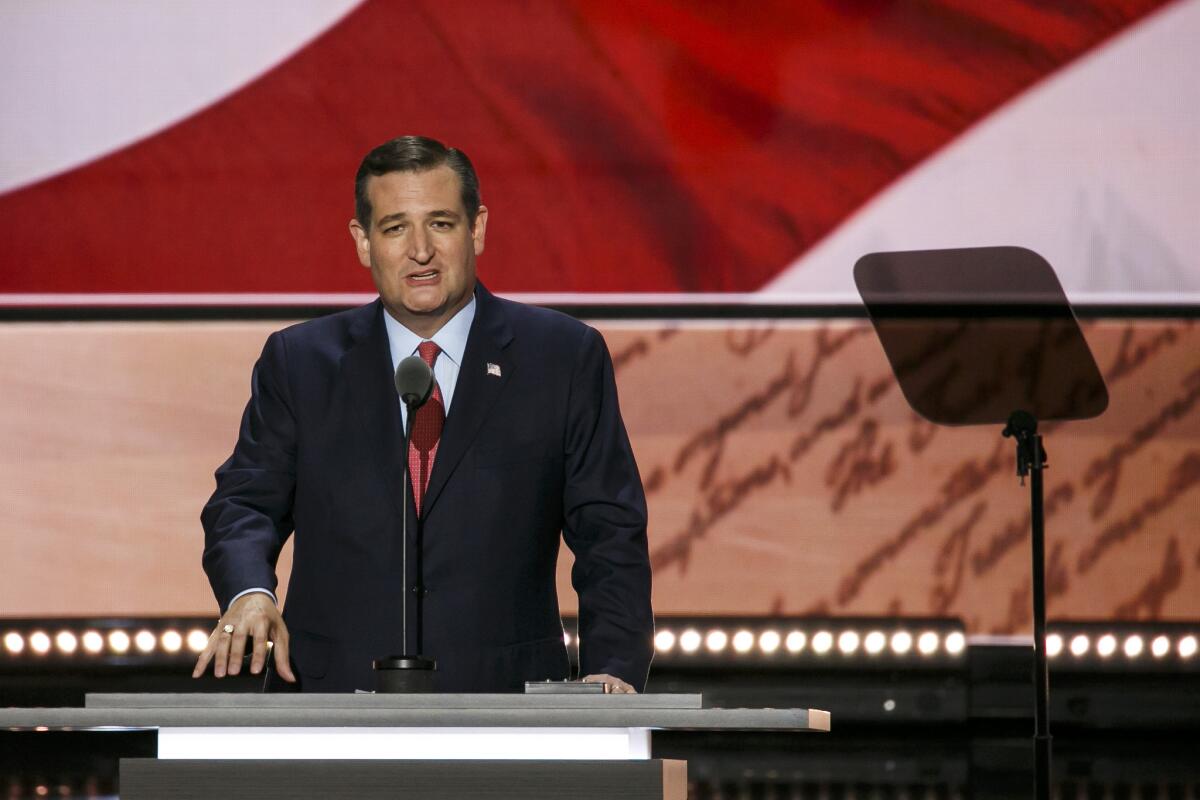Opinion: Trump’s chance: Will he unify the GOP, or divide it?

As the Republican National Convention comes to a close tonight, Donald Trump will finally shift from lurking in the hall (except for strategic cameo appearances) to taking center stage for The Big Keynote. History suggests the speech will be forgettable — do you remember what Mitt Romney or Barack Obama said four years ago? or John McCain eight years ago? — but the unusual circumstances set the stage for something more memorable.
Trump could follow the usual custom and present his vision for the presidency: what the biggest issues are, what he plans to do about them, why he’s better suited for the task than “Crooked” Hillary Clinton, blah, blah, blah. That’s a recipe for a garden-variety stump speech with little staying power.
More important, it would be the wrong speech to give at this particular convention. The party laid bare its lingering division on a chaotic convention floor Monday, when NeverTrumpers noisily (and futilely) demanded a roll-call vote in their quixotic effort to free Trump’s delegates to vote for someone else. Sen. Ted Cruz underlined that fissure brassily in his speech at Quicken Loans Arena on Wednesday (you know, the one in which he invoked his 28th Amendment right not to endorse Trump).
These events cry out for Trump to make a Herculean effort to unify the party behind him — not simply by equating another Clinton presidency with the apocalypse, but reaching out to disaffected conservatives with a set of goals they’ll believe in fighting for. In short, he needs to lay out a blueprint for a presidency that even Cruz’s supporters (and those of the other also-rans) would covet.
Granted, that may be an impossible task.
In an even more sanctimonious speech Thursday morning, Cruz laid out the challenge succinctly. “There’s a lot of talk about unity,” he said to a gathering of Cruz delegates. “I want to see unity, and the way to see unity is for us to unite behind shared principles, us to unite in defense of liberty.”
Even if every delegate in Cleveland channeled Cruz and put ‘the defense of liberty’ at the top of their agenda, they may not agree on which liberty to defend.
The key phrase there is “shared principles.” It’s not hard to identify what Republicans share in the abstract: a strong faith in free markets and small government. But when you start zooming in, the details don’t align so well.
For example, how does small government translate in foreign policy? For Trump it means not getting involved in sectarian Middle Eastern conflicts, evidently. But others in the GOP crave a much more muscular foreign policy, which would require growing the defense budget at a faster rate.
Then there’s international trade. Traditionally, free-market Republicans have favored free-trade deals because they promote seamless global commerce. But Trump (like many Democrats) wants to shift toward a fair-trade policy that seeks to narrow the gap between U.S. imports and exports. That break from GOP orthodoxy misses an important fact about trade’s effect on the economy. As Greg Ip ably explained in the Wall Street Journal on Thursday, trade deficits aren’t as important a consideration as the volume of activity generated by a trade deal. Americans benefit from increases both in imports and in exports, albeit in different ways.
Even if every delegate in Cleveland channeled Cruz and put “the defense of liberty” at the top of their agenda, they may not agree on which liberty to defend. Is it the liberty to terminate an unwanted pregnancy? (OK, maybe that’s an easy “no,” at least at this week’s political convention.) To protest against an over-powerful government, if the power happens to be exerted by a police officer? To marry whom you love? To start an online business without fear of being interfered with by Internet service providers? To enjoy one’s property without having it polluted by nearby industries?
Let’s be clear, this isn’t a problem unique to Republicans. It’s just as true for Democrats, if not more so. Substitute “Bernie Sanders” for “Ted Cruz” and you’ll have the template.
Nevertheless, Trump has to try to bring the party together, just as he has to try to appeal to centrist Democrats and non-aligned voters. And he would be well served not to follow Cruz’s lead, at least in this respect: You can’t unify people unless you’re willing to move toward middle ground. Otherwise, you’re just telling them to dump their beliefs in favor of yours. That’s a reality ignored by too many people in this polarized country, even those talking about the need for unity.
Twitter: @jcahealey
ALSO
The revolution may be delayed: A reporter’s diary from outside the GOP convention
The ‘Vote Your Conscience’ signs have arrived outside the GOP convention
Horsey: Trump gets even by spoiling Ted Cruz’s speech finale
More to Read
A cure for the common opinion
Get thought-provoking perspectives with our weekly newsletter.
You may occasionally receive promotional content from the Los Angeles Times.







